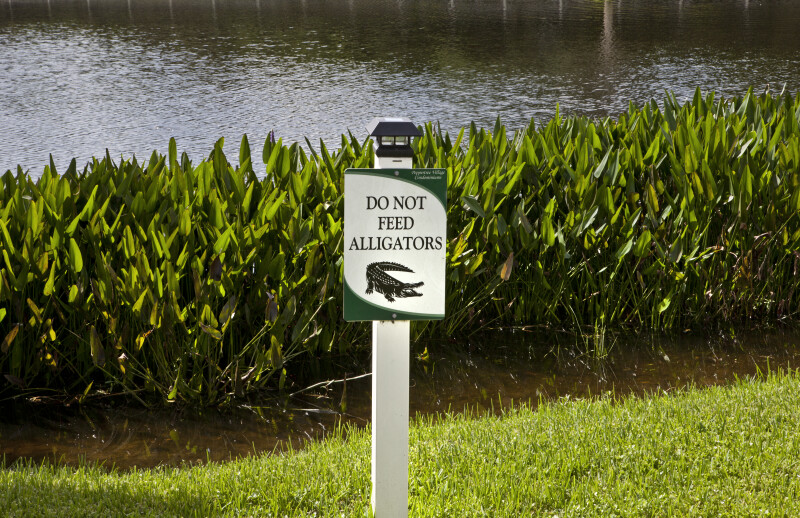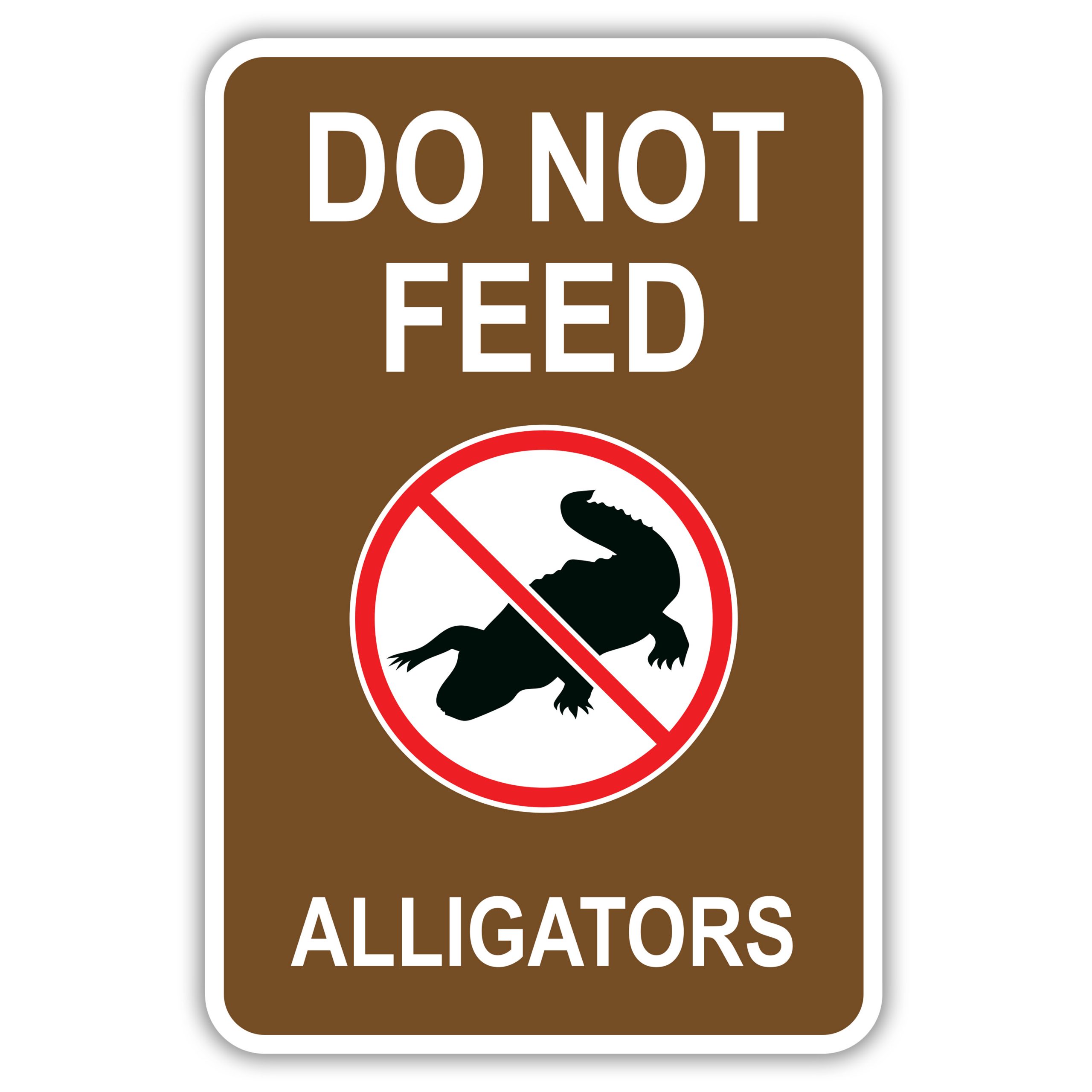Why "Do Not Feed Alligators" Is A Life-Saving Rule You Need To Follow
Let’s cut to the chase: feeding alligators is a seriously bad idea, and it’s not just because they’re wild animals. When you mess with nature, things can go sideways real quick. Alligators are predators, plain and simple. They’re not here to be your buddy or take snacks from your hand. If you’ve ever wondered why park rangers, wildlife experts, and even common sense scream this rule at you, stick around. We’re diving deep into why you should never feed alligators.
Feeding alligators might seem harmless, especially if you're just tossing them a little fish or some leftover chicken. But trust me, that little act can lead to big trouble. Alligators are creatures of habit, and when they start associating humans with food, it changes their natural behavior. Suddenly, they're not afraid of you anymore, and that's when things get dangerous. We’re talking about an animal that can weigh over 1,000 pounds and has teeth sharp enough to crush turtle shells. You don’t wanna mess with that.
This isn’t just about your safety—it’s about the alligator’s survival too. When people feed them, it disrupts their natural instincts, and they start hanging around human-populated areas, looking for more snacks. This often leads to conflicts where the alligator gets labeled as a "nuisance" and ends up being relocated or even killed. So, if you care about these incredible creatures, the best thing you can do is leave them alone and let them live their wild lives.
Read also:White Bison Coffee The Ultimate Brew Experience You Cant Miss Out On
Why Feeding Alligators is a Recipe for Disaster
Here’s the thing: alligators are amazing animals that have been around for millions of years. They’re perfectly adapted to their environment, and they don’t need your help to survive. But when humans intervene, especially by feeding them, it creates a dangerous cycle. Alligators lose their natural fear of humans, which is called "habituation." This means they start seeing us as a source of food instead of something to avoid.
Now, imagine you’re out for a stroll near a pond or lake, and an alligator decides to approach you because it thinks you have food. That’s not a situation you want to find yourself in. Alligators are powerful predators, and while they’re not typically aggressive toward humans, they can become dangerous if they’ve been conditioned to associate people with food. It’s not just a risk to you—it’s a risk to everyone around you.
What Happens When Alligators Get Too Close?
When alligators become too accustomed to humans, they start showing up in places they shouldn’t be. They might wander into backyards, parks, or even golf courses, looking for their next meal. This can lead to dangerous encounters with unsuspecting people or pets. In some cases, it ends with the alligator being captured and relocated, which is stressful for the animal and often doesn’t work out well for them. In extreme cases, the alligator might be euthanized if it’s deemed too much of a threat.
Relocation isn’t always a viable solution because alligators have a strong homing instinct. They can travel long distances to return to their original territory, and during that journey, they might encounter other dangers, like cars or larger predators. It’s a lose-lose situation for everyone involved, and it all starts with someone deciding to feed an alligator.
Understanding Alligator Behavior
Alligators are fascinating creatures with behaviors that have evolved over millions of years. They’re ambush predators, which means they rely on stealth and surprise to catch their prey. In the wild, they feed on fish, birds, turtles, and small mammals. They don’t naturally see humans as food, but when they start associating us with food, that changes.
One of the biggest misconceptions about alligators is that they’re always hungry. In reality, they have a slow metabolism and can go weeks without eating. But when they do eat, they go all in. Their powerful jaws and sharp teeth make them incredibly efficient hunters. So, if an alligator sees you as a potential meal, it’s not messing around. It’s going to act quickly and decisively.
Read also:Hollywood Blvd Cinema The Iconic Heart Of Movie Magic
How Alligators React to Human Interaction
When alligators are left alone in their natural habitat, they usually avoid humans. They’re more interested in staying hidden and waiting for their next meal. But when they start getting fed by humans, their behavior changes. They become bolder, more aggressive, and less afraid of people. This can lead to dangerous situations, especially for children or pets who might not realize the risks.
Studies have shown that alligators that are fed by humans are more likely to approach people and stay in human-populated areas. This behavior can escalate quickly, turning a once-shy alligator into a potential threat. It’s not just about the immediate danger—it’s about the long-term impact on the alligator population as a whole.
The Legal and Ethical Implications of Feeding Alligators
Feeding alligators isn’t just a bad idea—it’s often illegal. Many states, especially those with large alligator populations like Florida, have strict laws against feeding these animals. The penalties can range from fines to jail time, depending on the severity of the offense. These laws are in place to protect both humans and alligators, but they’re only effective if people follow them.
From an ethical standpoint, feeding alligators is simply wrong. It disrupts the natural balance of the ecosystem and puts both humans and animals at risk. Alligators are an important part of the wetland ecosystem, and they help control the populations of other animals. By interfering with their natural behavior, we’re doing more harm than good.
What Happens if You Get Caught Feeding an Alligator?
If you’re caught feeding an alligator, you could face serious consequences. In Florida, for example, the fine for feeding alligators is $500 per offense. That’s a pretty steep price to pay for something that’s not only dangerous but also illegal. And if your actions lead to an alligator being labeled as a "nuisance" and euthanized, you could face even harsher penalties.
It’s not just about the money, though. Feeding alligators can have long-lasting effects on the environment and the animals themselves. It’s important to remember that we share this planet with other creatures, and it’s our responsibility to respect their space and let them live their lives without interference.
How to Stay Safe Around Alligators
If you live in or visit an area with alligators, it’s important to know how to stay safe. The first rule, of course, is to never feed them. But there are other precautions you can take to minimize the risk of an encounter. For example, avoid swimming in areas where alligators are known to live, especially at dawn and dusk when they’re most active. Keep your pets on a leash and away from the water’s edge, and never approach an alligator, no matter how small it looks.
Remember, alligators are wild animals, and they deserve our respect. By following these simple guidelines, you can help ensure that both you and the alligator stay safe.
Tips for Coexisting with Alligators
- Stay at least 60 feet away from alligators in the wild.
- Avoid swimming in areas where alligators are known to live.
- Keep pets on a leash and away from water sources.
- Do not approach baby alligators or their nests.
- Dispose of food waste properly to avoid attracting alligators.
These tips might seem like common sense, but they’re crucial for avoiding dangerous situations. Alligators are incredible animals, and observing them from a safe distance can be a thrilling experience. Just remember to keep your distance and let them be.
The Role of Education in Preventing Alligator Feeding
One of the best ways to prevent people from feeding alligators is through education. Many people simply don’t realize the dangers of feeding wild animals, or they underestimate the risks involved. By raising awareness about the importance of respecting wildlife, we can help reduce the number of dangerous encounters between humans and alligators.
Schools, parks, and conservation organizations can play a big role in educating the public about alligator safety. This can include everything from informational signs at parks to interactive programs for kids. The more people know about alligators and their behavior, the better equipped they’ll be to coexist with them safely.
How You Can Help Spread Awareness
You don’t have to be a wildlife expert to help spread the word about alligator safety. Simply sharing information with friends and family can make a big difference. If you see someone feeding an alligator, gently remind them of the risks involved. You can also support organizations that work to protect alligators and their habitats.
By working together, we can create a safer environment for both humans and alligators. It’s all about education, respect, and understanding the importance of leaving wild animals alone.
The Future of Alligator Conservation
Alligators are an important part of the ecosystem, and their survival depends on our ability to coexist with them. By following rules like "do not feed alligators," we can help ensure that these incredible animals continue to thrive in the wild. Conservation efforts are crucial for protecting alligator populations, and everyone has a role to play.
From protecting wetlands to reducing pollution, there are many ways we can help preserve the habitats that alligators depend on. It’s not just about saving one species—it’s about preserving the entire ecosystem that supports so many different forms of life.
What You Can Do to Support Alligator Conservation
- Support organizations that work to protect alligator habitats.
- Practice responsible tourism by respecting wildlife and their environments.
- Reduce your carbon footprint to help combat climate change, which affects all ecosystems.
- Spread awareness about the importance of coexisting with alligators and other wildlife.
Every little bit helps, and by working together, we can create a brighter future for alligators and the ecosystems they call home.
Conclusion: Let’s Keep Alligators Wild and Free
Feeding alligators might seem like a harmless act, but it has far-reaching consequences that can put both humans and animals at risk. By following the simple rule of "do not feed alligators," we can help ensure that these incredible creatures continue to thrive in the wild. Remember, alligators are an important part of the ecosystem, and it’s our responsibility to respect their space and let them live their lives without interference.
So, the next time you’re out enjoying nature, take a moment to appreciate the beauty of alligators from a safe distance. And if you see someone feeding them, don’t hesitate to speak up. Together, we can create a safer, more sustainable world for all living creatures.
Now, it’s your turn. Share this article with your friends and family, and let’s spread the word about alligator safety. And if you have any questions or comments, feel free to leave them below. Let’s keep the conversation going!
Table of Contents
- Why Feeding Alligators is a Recipe for Disaster
- Understanding Alligator Behavior
- The Legal and Ethical Implications of Feeding Alligators
- How to Stay Safe Around Alligators
- The Role of Education in Preventing Alligator Feeding
- The Future of Alligator Conservation
- Conclusion: Let’s Keep Alligators Wild and Free


